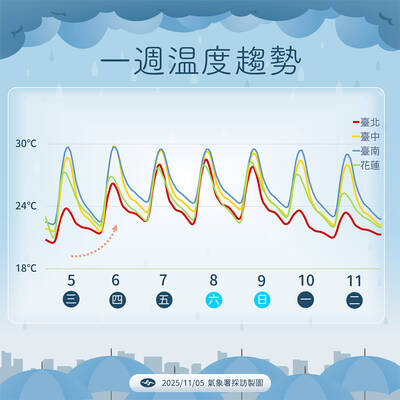Formosa Plastics Group yesterday rejected an allegation that its naphtha cracker in Yunlin County’s Mailiao Township (麥寮) was behind a recent surge of PM2.5 pollutants in central Taiwan, laying the blame on wind and the burning of agricultural waste.
Levels of PM2.5 — airborne pollutants measuring less than 2.5 micrometers — in Nantou County, Taichung and Yunlin earlier this week reached “red levels,” at which point there is a greater risk of health problems for sensitive groups — those with chronic respiratory or cardiovascular diseases and senior citizens.
The PM2.5 reading in Yunlin’s Lunbei Township (崙背) on Tuesday was 79 micrograms per cubic meter, which was more than twice the national daily average of 35 micrograms per cubic meter, leading the Environmental Protection Administration (EPA) to issue a recommendation that lasted until yesterday for residents to avoid outdoor activities
A report by the Chinese-language Liberty Times (the sister newspaper of the Taipei Times) on Wednesday quoted EPA Department of Environmental Monitoring and Information Management Director-General Tsai Hung-te (蔡鴻德) as saying: “The elevated PM2.5 levels in central Taiwan were caused by emissions from the Mailiao naphtha cracker and fugitive emissions from the Jhuoshuei River (濁水溪), as well as poor atmospheric diffusion in the area.”
Formosa Plastics said in a statement on Tuesday that the burning of harvest season agricultural waste in Yunlin’s Lunbei and Siluo (西螺) townships, coupled with low wind speeds and inconsistent wind direction due to the transition between seasons, resulted in the buildup of pollutants and hazy conditions.
Annual PM2.5 levels recorded at the air pollution observation station in Lunbei averaged between 8 micrograms per cubic meter and 12 micrograms per cubic meter, but the reading soared to more than 70 micrograms per cubic meter once the burning of agricultural waste began this month, the company said.
The company said that nationwide PM2.5 levels were elevated, and that even an observation station in Taipei’s Yangmingshan National Park recorded excessive PM2.5 levels, suggesting that climate was a principal factor and that the naptha cracker was not a major contributor to air pollution.
Formosa Plastics said that the facility’s emissions of particulate matter, sulfur dioxide and volatile organic compounds were consistent with environmental standards, and that there has been no significant change in the volume of the plant’s emissions, despite the dramatic increase in the PM2.5 readings at the Lunbei station.

Three Taiwanese airlines have prohibited passengers from packing Bluetooth earbuds and their charger cases in checked luggage. EVA Air and Uni Air said that Bluetooth earbuds and charger cases are categorized as portable electronic devices, which should be switched off if they are placed in checked luggage based on international aviation safety regulations. They must not be in standby or sleep mode. However, as charging would continue when earbuds are placed in the charger cases, which would contravene international aviation regulations, their cases must be carried as hand luggage, they said. Tigerair Taiwan said that earbud charger cases are equipped

Foreign travelers entering Taiwan on a short layover via Taiwan Taoyuan International Airport are receiving NT$600 gift vouchers from yesterday, the Tourism Administration said, adding that it hopes the incentive would boost tourism consumption at the airport. The program, which allows travelers holding non-Taiwan passports who enter the country during a layover of up to 24 hours to claim a voucher, aims to promote attractions at the airport, the agency said in a statement on Friday. To participate, travelers must sign up on the campaign Web site, the agency said. They can then present their passport and boarding pass for their connecting international

UNILATERAL MOVES: Officials have raised concerns that Beijing could try to exert economic control over Kinmen in a key development plan next year The Civil Aviation Administration (CAA) yesterday said that China has so far failed to provide any information about a new airport expected to open next year that is less than 10km from a Taiwanese airport, raising flight safety concerns. Xiamen Xiangan International Airport is only about 3km at its closest point from the islands in Kinmen County — the scene of on-off fighting during the Cold War — and construction work can be seen and heard clearly from the Taiwan side. In a written statement sent to Reuters, the CAA said that airports close to each other need detailed advanced

UNKNOWN TRAJECTORY: The storm could move in four possible directions, with the fourth option considered the most threatening to Taiwan, meteorologist Lin De-en said A soon-to-be-formed tropical storm east of the Philippines could begin affecting Taiwan on Wednesday next week, the Central Weather Administration (CWA) said yesterday. The storm, to be named Fung-wong (鳳凰), is forecast to approach Taiwan on Tuesday next week and could begin affecting the weather in Taiwan on Wednesday, CWA forecaster Huang En-hung (黃恩鴻) said, adding that its impact might be amplified by the combined effect with the northeast monsoon. As of 2pm yesterday, the system’s center was 2,800km southeast of Oluanbi (鵝鑾鼻). It was moving northwest at 18kph. Meteorologist Lin De-en (林得恩) on Facebook yesterday wrote that the would-be storm is surrounded by